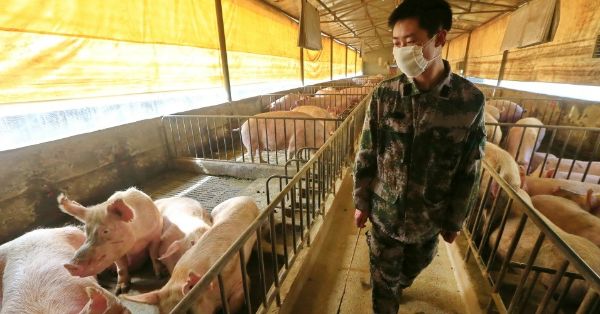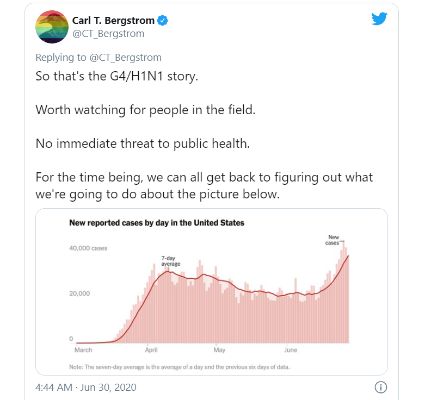New Virus Reported In China Highlights Risk Of Animal-Borne Pandemic Originating In Factory Farms
"We are constantly at risk of new emergence of zoonotic pathogens and that farmed animals, with which humans have greater contact than with wildlife, may act as the source for important pandemic viruses."
by Julia Conley, staff writer

A study released Monday identified a new strain of the H1N1 influenza virus in China, reinforcing warnings from public health experts regarding humans' close contact with animals under the factory farming and illegal animal trade systems which currently exist around the world.
Scientists at universities in China and at the country's Center for Disease Control and Prevention call the virus G4 and say it's descended from the H1N1 virus which caused a pandemic in 2009.
The virus has been a dominant strain of influenza among pigs since 2016.
The disease has infected more than one in 10 pig farm workers according to the study, published in the Proceedings of the National Academy of Sciences (PNAS), while 4.4% of 230 people surveyed in the general population across 10 Chinese provinces had also contracted the virus.
"We need to be vigilant about other infectious disease threats even as Covid is going on because viruses have no interest in whether we're already having another pandemic."
—Martha Nelson, National Institutes of Health
"The work comes as a salutary reminder that we are constantly at risk of new emergence of zoonotic pathogens and that farmed animals, with which humans have greater contact than with wildlife, may act as the source for important pandemic viruses," Professor James Wood, head of the Department of Veterinary Medicine at the University of Cambridge, said in a statement.
As Common Dreams reported in March, the global coronavirus outbreak has led environmental experts to warn that humans must prioritize efforts to contain habitat destruction and the exploitation of animals to avoid another pandemic. The first human infections in the pandemic were linked to a live animal market, or wet market, in Wuhan, China.
"Never before have so many opportunities existed for pathogens to pass from wild and domestic animals to people," U.N. Environmental Program director Inger Andersen said in March, referring to illegal animal trades in live markets, industrialized farming in which antibiotics are heavily used, and extractive industries which destroy wildlife habitats.
In 2009, the H1N1 virus first circulated among humans in the U.S. after spreading in pig farms like the ones studied in China. The virus killed as many as 575,000 people worldwide.
"We have abundant evidence documenting the fact that when you put animals in crowded, unsanitary conditions and use low-dose antibiotics for disease prevention, you set up a perfect incubator for spontaneous mutations in the DNA of the bacteria," Robert Lawrence, a professor emeritus of environmental health at John Hopkins University, told Vox in April. "With more spontaneous mutations, the odds increase that one of those mutations will provide resistance to the antibiotic that's present in the environment... That's the biggest human health risk of factory farms."
Scientists say there is currently no evidence of human-to-human transmission, but the researchers wrote that G4 has "all the essential hallmarks of being highly adapted to infect humans" and has already jumped from animals to humans.
Existing vaccines for the seasonal flu were not effective at providing immunity to G4 in the study, which the World Health Organization is currently reviewing. Martha Nelson, an evolutionary biologist at the U.S. National Institutes of Health, told Science magazine that scientists should prepare now for the disease to potentially affect a large number of humans around the world, by adapting existing flu vaccines.
"We need to be vigilant about other infectious disease threats even as Covid is going on because viruses have no interest in whether we're already having another pandemic," Nelson said.
Public health expert Carl Bergstrom noted on social media that the G4 virus is "worth watching" for epidemiologists but that unlike Covid-19, it poses "no immediate threat to public health."

"We should not focus on any one virus exclusively," Dr. Angela Rasmussen, a virologist at Columbia University, added. "We should prepare for ANY kind of emerging influenza pandemic."


 Binoy Kampmark: The Trauma Will Be Instagrammed - Wombat Handlings Down Under
Binoy Kampmark: The Trauma Will Be Instagrammed - Wombat Handlings Down Under Keith Rankin: Geopolitical Fractures, And Untidy Yet Workable Solutions
Keith Rankin: Geopolitical Fractures, And Untidy Yet Workable Solutions Gordon Campbell: On Winston Peters’ Battle Against The Phantom Legions Of The Woke
Gordon Campbell: On Winston Peters’ Battle Against The Phantom Legions Of The Woke Adrian Maidment: Road Cone Final Exam & Donald, I Warned You!
Adrian Maidment: Road Cone Final Exam & Donald, I Warned You! Binoy Kampmark: The Script Of Anxiety - Poland’s Nuclear Weapons Fascination
Binoy Kampmark: The Script Of Anxiety - Poland’s Nuclear Weapons Fascination Martin LeFevre - Meditations: Regarding Randomness And Significance
Martin LeFevre - Meditations: Regarding Randomness And Significance